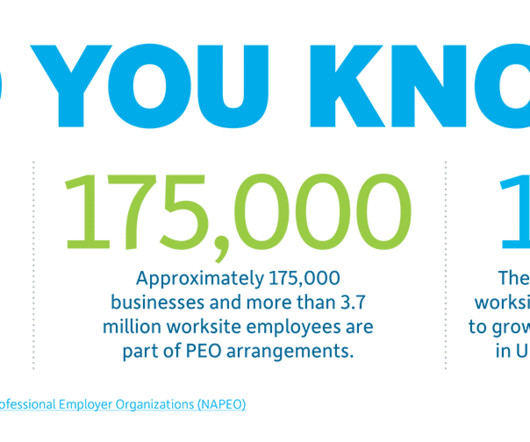Lockton
HR Lineup
FEBRUARY 14, 2023
They offer a range of products and services, including health insurance, retirement plans, life insurance, and disability insurance, as well as voluntary benefits such as pet insurance, legal services, and more.
This site uses cookies to improve your experience. To help us insure we adhere to various privacy regulations, please select your country/region of residence. If you do not select a country, we will assume you are from the United States. Select your Cookie Settings or view our Privacy Policy and Terms of Use.
Cookies and similar technologies are used on this website for proper function of the website, for tracking performance analytics and for marketing purposes. We and some of our third-party providers may use cookie data for various purposes. Please review the cookie settings below and choose your preference.
Used for the proper function of the website
Used for monitoring website traffic and interactions
Cookies and similar technologies are used on this website for proper function of the website, for tracking performance analytics and for marketing purposes. We and some of our third-party providers may use cookie data for various purposes. Please review the cookie settings below and choose your preference.

HR Lineup
FEBRUARY 14, 2023
They offer a range of products and services, including health insurance, retirement plans, life insurance, and disability insurance, as well as voluntary benefits such as pet insurance, legal services, and more.

HR Digest
MAY 21, 2023
From mandated health insurance plans to free snacks, benefits and perks can play a big role in talent attraction and employee retention. So the question is how to design an employee benefit plan, and for that one needs to consider a variety of factors, such as: 1. Health insurance 2. Payroll taxes 2.
This site is protected by reCAPTCHA and the Google Privacy Policy and Terms of Service apply.

Higginbotham
OCTOBER 29, 2024
Their expertise lies in understanding the insurance landscape and creating benefits packages that meet the unique needs of an employer’s workforce. This involves tailoring core benefits like health, dental and vision insurance while incorporating voluntary options, such as disability insurance, mental health benefits or life insurance.

HR Lineup
FEBRUARY 14, 2023
They offer a wide range of services, including group health insurance, dental and vision coverage, life insurance, short- and long-term disability insurance, flexible spending accounts, and more. These services help employees build a solid financial foundation and feel more secure about their future.

Empuls
AUGUST 28, 2024
These providers handle the complex tasks of negotiating with insurance companies, managing enrollment processes, and ensuring compliance with regulations. They help identify the most suitable benefits, such as health insurance, retirement plans, and wellness programs.

Achievers
FEBRUARY 2, 2021
Federal and state mandated benefits include health insurance, worker’s compensation, unemployment insurance, and required leave time for caring for family and/or personal medical purposes. Health insurance, and family and medical leave, are not required for all businesses.

Empuls
DECEMBER 24, 2024
These benefits range from health insurance to retirement plans, paid time off (PTO), and wellness programs. Some of its key components include: Health insurance: Covers medical expenses. Some of its key components include: Health insurance: Covers medical expenses.

Hppy
NOVEMBER 26, 2024
Some of these include: Health Insurance When evaluating a new job opportunity, many employees place a high value on the health insurance benefits provided by a potential employer. Retirement Plans Many job seekers today are looking for a company they can truly invest in.

Insperity
MAY 27, 2013
Don’t offer health insurance to your employees. Under health care reform, you don’t have to offer health insurance to your employees. If you have fewer than 50 employees, you are not subject to the Play or Pay rules, so there is no penalty for not offering health insurance.

Insperity
FEBRUARY 13, 2018
Start by offering a solid benefits package that includes a great portfolio of health insurance options to choose from. This alone can help ease some of your employees’ money concerns because they will have the opportunity to get things like medical insurance, disability, flexible spending accounts, retirement plans and more.

Higginbotham
OCTOBER 14, 2022
Health Insurance for Small Business. Under the ACA, small employers with fewer than 50 full-time equivalent employees are not required to offer health insurance or subject to the employer shared responsibility provisions. However, many small business owners offer health insurance coverage anyway.

Insperity
MAY 26, 2023
Access to comprehensive benefit plans Partnering with a PEO means that your employees can gain access to comprehensive benefit plans that are comparable to those found at large companies. This may include: Health insurance 401(k) retirement plans Healthcare FSA/HSA programs Life/disability insurance 2.

Insperity
FEBRUARY 20, 2020
These things have become so commonplace that employees expect them, such as: Health insurance Dental insurance Paid vacation and sick days 401(k) retirement plan Disability insurance Life insurance Workers’ compensation Unemployment insurance.

Higginbotham
APRIL 25, 2022
Health Insurance, Telemedicine and Wellness Programs. Health insurance remains a staple of the standard employee benefits package. Despite the investment that employers are putting into health insurance benefits, many workers are not satisfied. These insurance options are often offered as voluntary benefits.

COMPackage
SEPTEMBER 30, 2024
Long-Term Incentives: This may involve stock options, restricted stock units, or profit-sharing plans.

Insperity
APRIL 14, 2022
Many companies provide a basic benefits package that may offer employees access to things like: Health insurance. Dental insurance. Vision insurance. Life insurance. Disability insurance. Retirement plan. For example: Can your company match employee contributions to retirement plans?

Higginbotham
AUGUST 13, 2024
workers postpone health care needs because they’re worried about cost, even if they have health insurance. Medical care can be expensive, and group health insurance isn’t always enough. What is hospital indemnity insurance? The policy pays a benefit if the insured is hospitalized.

COMPackage
OCTOBER 10, 2024
Indirect Pay: This includes all of the employee’s benefits, such as health insurance, retirement plans, paid time off, life insurance, and disability insurance.

COMPackage
JULY 24, 2024
By quantifying the value of health insurance, retirement contributions, paid time off, and other perks, organizations can demonstrate the significant investment they make in their employees’ well-being. The Importance of Effective Benefits Communication Employees often underestimate the value of their benefits.

HR Digest
NOVEMBER 10, 2022
These benefits range from health insurance to paid time off. These plans cover the aspects of an employee’s life where solutions can be offered. Examples of these benefits include retirement plans (such as 401(K), ESOP, etc), reimbursement plans for travel or tuition, employee bonus , paid time off (PTO), and many more.

Higginbotham
MAY 21, 2024
Mental health can also impact productivity: a literature review of 38 studies found clear evidence that poor mental health, particularly due to depression and anxiety, is associated with lost productivity, which can stem from absenteeism and presenteeism. By supporting mental health, employers may be able to contain costs.

Vantage Circle
NOVEMBER 30, 2022
You want your employee benefits package to include at least some of these popular fringe benefits : Health insurance. Life insurance. Disability insurance. Retirement planning services. Tuition assistance. Paid Time Off (PTO). Employee Assistance Programs (EAPs). Learning and development stipends.

Higginbotham
JANUARY 18, 2022
Retirement Plans. Health Insurance. Other Insurance (Dental Insurance, Vision Insurance, Life Insurance, Disability Insurance, Pet Insurance, etc.). A total compensation package can include a number of different items, such as: Base Salary or Annual Wages. Commissions.

COMPackage
OCTOBER 2, 2024
Benefits: Detail all benefits provided, such as: Health insurance (medical, dental, vision) Retirement plans (401(k), pension) Paid time off (PTO, vacation, sick leave) Life insurance Disability insurance Employee assistance programs (EAPs) Education assistance Other benefits (e.g.,

COMPackage
SEPTEMBER 25, 2024
Benefits: This section should detail all benefits provided, such as: Health insurance (medical, dental, vision) Retirement plans (401(k), pension) Paid time off (PTO, vacation, sick leave) Life insurance Disability insurance Employee assistance programs (EAPs) Education assistance Other benefits (e.g.,

COMPackage
SEPTEMBER 23, 2024
Benefits: Detail all benefits provided, such as: Health insurance (medical, dental, vision) Retirement plans (401(k), pension) Paid time off (PTO, vacation, sick leave) Life insurance Disability insurance Employee assistance programs (EAPs) Education assistance Other benefits (e.g.,

COMPackage
SEPTEMBER 19, 2024
Benefits: Detail all benefits provided, such as: Health insurance (medical, dental, vision) Retirement plans (401(k), pension) Paid time off (PTO, vacation, sick leave) Life insurance Disability insurance Employee assistance programs (EAPs) Education assistance Other benefits (e.g.,

COMPackage
SEPTEMBER 18, 2024
Benefits: This section should detail all benefits provided, such as: Health insurance (medical, dental, vision) Retirement plans (401(k), pension) Paid time off (PTO, vacation, sick leave) Life insurance Disability insurance Employee assistance programs (EAPs) Education assistance Other benefits (e.g.,

COMPackage
SEPTEMBER 13, 2024
Benefits: This section should detail all benefits provided, such as: Health insurance (medical, dental, vision) Retirement plans (401(k), pension) Paid time off (PTO, vacation, sick leave) Life insurance Disability insurance Employee assistance programs (EAPs) Education assistance Other benefits (e.g.,

Vantage Circle
JANUARY 30, 2022
Group-term life insurance coverage. Retirement planning services. Some examples are retirement benefits, child care, health insurance, employee rewards, disability insurance, etc. Employee stock options. Employer-provided cell phones. Lodging on your business premises. Tuition reduction.

COMPackage
SEPTEMBER 30, 2024
Benefits: This section should detail all benefits provided, such as: Health insurance (medical, dental, vision) Retirement plans (401(k), pension) Paid time off (PTO, vacation, sick leave) Life insurance Disability insurance Employee assistance programs (EAPs) Education assistance Other benefits (e.g.,

COMPackage
SEPTEMBER 27, 2024
Benefits: This section should detail all benefits provided, such as: Health insurance (medical, dental, vision) Retirement plans (401(k), pension) Paid time off (PTO, vacation, sick leave) Life insurance Disability insurance Employee assistance programs (EAPs) Education assistance Other benefits (e.g.,

Corporate Synergies
AUGUST 6, 2018
The opportunity to set aside pre-tax money for expenses in the future is an area where the HSAs and retirement plans, like 401(k) and 403(b), start to blend together in an employee’s retirement savings strategy. Using HSAs as an Investment Strategy for Retirement. Use Employee Education to Educate about HSA Value.

Empuls
DECEMBER 17, 2024
An employee benefits program is a structured plan that provides additional compensation and perks beyond an employee’s salary. These programs typically include health insurance, retirement savings plans, paid time off, and wellness initiatives. What is an employee benefits program?

COMPackage
SEPTEMBER 12, 2024
Benefits: Detail all benefits provided, such as: Health insurance (medical, dental, vision) Retirement plans (401(k), pension) Paid time off (PTO, vacation, sick leave) Life insurance Disability insurance Employee assistance programs (EAPs) Education assistance Other benefits (e.g.,

Higginbotham
DECEMBER 30, 2021
Health insurance. Retirement plans. Other insurance types/voluntary insurance (vision insurance, dental insurance, critical illness insurance, long-term care insurance, life insurance, disability insurance, pet insurance, etc.). Mental health support.

Empuls
MAY 7, 2023
Certain benefits like health insurance can promote employee wellness and reduce absenteeism, which can be beneficial for both the employee and the company. Health and wellness benefits These benefits include medical, dental, vision, and other health-related benefits.

Patriot Software
FEBRUARY 20, 2019
Payments not subject to federal income tax include pre-tax retirement plan contributions, health insurance premiums, and commuter benefits. Let’s say an employee elected to contribute $1,000 to a retirement plan. Retirement plan. This is not a mistake. You would write D | 1,000.00

Empuls
APRIL 28, 2023
From healthcare and retirement plans to flexible work arrangements and professional development opportunities, employees are looking for a comprehensive benefits package that meets their unique needs and preferences. The maximum deduction limit for health insurance premiums is rs. An additional deduction of rs.

Vantage Circle
SEPTEMBER 11, 2023
Benefits platforms also allow companies to centralize and automate the administration of employee benefits, such as health insurance, retirement plans, paid time off, and more. For example, some platforms allow for integrating different benefits, such as health insurance, retirement plans, and wellness programs.

Vantage Circle
JUNE 24, 2019
The usual benefits include health insurance, retirement plans, health plan, insurance plans and much more. The benefits package that you offer will be crucial in achieving the organization's targets and goals in the long run. But how do you choose what benefits will be best for your employees?

Vantage Circle
MAY 22, 2019
No matter the type of insurance- be it life insurance, health insurance, disability insurance or retirement benefits- it heads the list of “must be provided” employee benefits. Tell employees that you don’t provide these type of benefit and watch the tp candidates walk right out of the job.

InterWest Insurance Services
OCTOBER 31, 2024
Middle class families — those with incomes of between roughly $50,000 and $100,000 per year — are becoming increasingly reliant on workplace benefits to ensure their financial well-being in case of a disability or critical illness. Simple health insurance is insufficient to carry the load. Are life insurance benefits adequate?

InterWest Insurance Services
AUGUST 30, 2022
Now more than ever, employers need to step up their employee benefits game beyond providing group health insurance. Good pay and a robust health insurance package still win the day, but employers are having to do more to sweeten the pot, according to a new survey by MetLife. 401(k)s or other retirement plans.
Expert insights. Personalized for you.
We have resent the email to
Are you sure you want to cancel your subscriptions?


Let's personalize your content